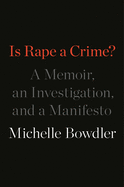
Framed by the story of Michelle Bowdler's uninvestigated rape and subsequent activism, Is Rape a Crime? criticizes the abhorrent trivialization of rape by the criminal justice system; it will move readers to demand change.
In 1984, two men broke into Michelle Bowdler's apartment and raped her repeatedly. The police considered her "lucky"--she could have been murdered, "a legitimate crime. But the crime [she] experienced was not." She completed a rape kit--a multi-hour exam for collecting evidence that could identify her perpetrators--but it would never be tested. Then, a 2007 Boston Globe article about untested sexual assault samples spurred her to become a social justice advocate, fighting for the testing of the estimated 400,000 untested rape kits across the U.S.
Bowdler's damning account argues that rape isn't--but must be--investigated as seriously as other felonies. She outlines a pervasive, destructive status quo wherein rape victims' allegations are dubiously dismissed as "unfounded." Bowdler cautions against "equat[ing] rape with sex" and thus "a male need"; reducing testimonies to "he said, she said" arguments; portraying a rapist's life as "ruined" as much as the survivor's; creating special victims units that simply mask neglect; or celebrating "weak apologies" in response to movements like #MeToo. Though she finds hope in activism, Bowdler stresses that it's not the job of survivors to effect change. Is Rape a Crime? is a searing condemnation of rape culture that firmly places the onus on law enforcement and legislators to reform broken systems. --Samantha Zaboski, freelance editor and reviewer

